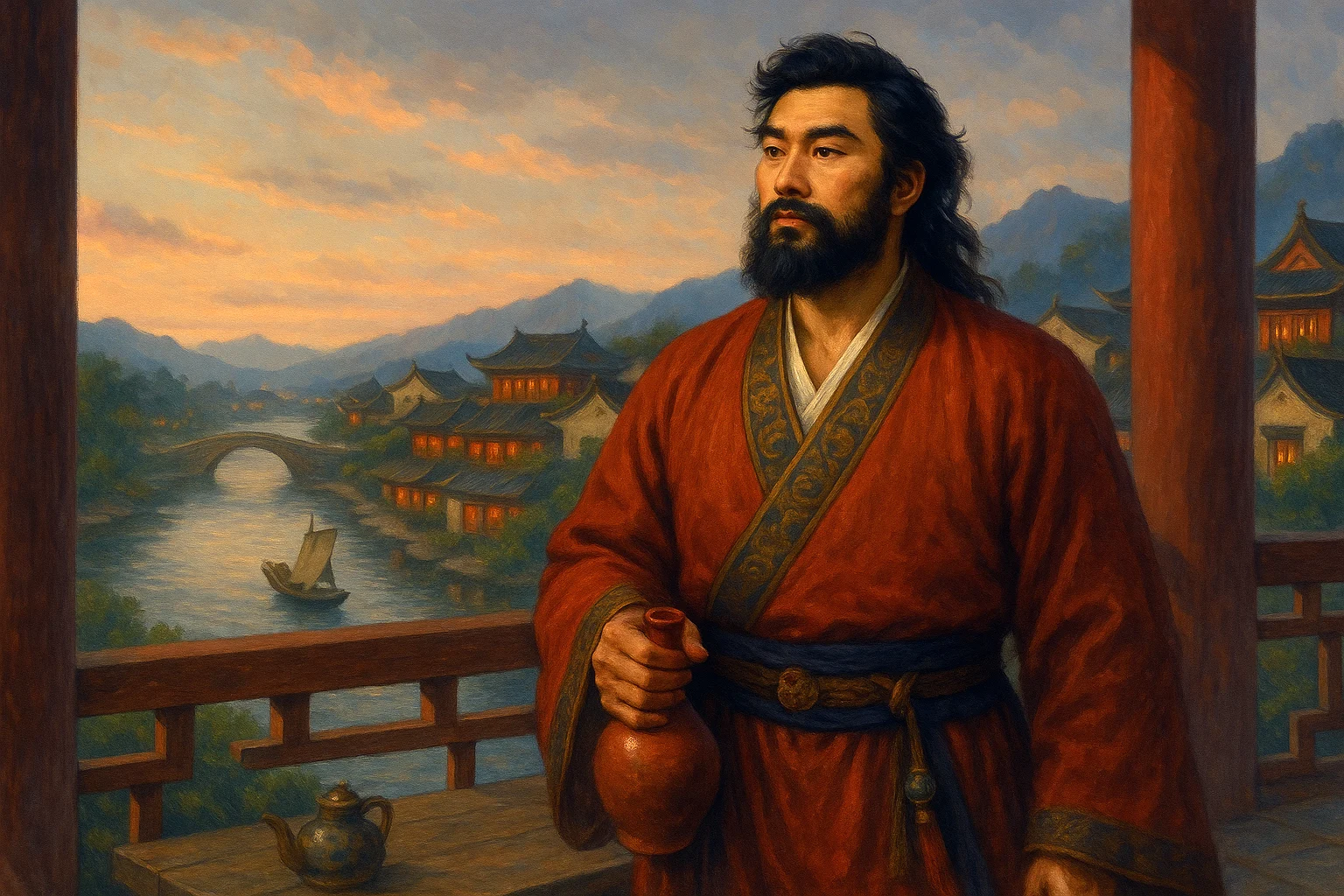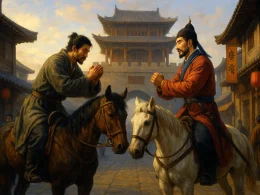The sun has set in the water's clear void,
And little blue islands are one with the sky.
On the bank a horse neighs. A boat goes by.
People gather at a willow- clump and wait for the ferry.
Down by the sand-bushes sea-gulls are circling,
Over the wide river-lands flies an egret.
...Can you guess why I sail, like an ancient wise lover,
Through the misty Five Lakes, forgetting words?
Original Poem:
「利洲南渡」
温庭筠
澹然空水对斜晖,曲岛苍茫接翠微。
波上马嘶看棹去,柳边人歇待船归。
数丛沙草群鸥散,万顷江田一鹭飞。
谁解乘舟寻范蠡?五湖烟水独忘机。
Interpretation
This poem was composed by Wen Tingyun while traveling through Lizhou and crossing the river. Lizhou, located in present-day Guangyuan, Sichuan, is embraced by the Jialing River, where mountains and waters intertwine, creating a breathtaking natural landscape. The poet, frustrated by repeated failures in the imperial examinations and a turbulent official career, often wandered aimlessly. During this river crossing, the scenery stirred his emotions, expressing his longing for a reclusive life and his disillusionment with worldly affairs.
First Couplet: "澹然空水对斜晖,曲岛苍茫接翠微。"
Dàn rán kōng shuǐ duì xié huī, qū dǎo cāng máng jiē cuì wēi.
The tranquil, empty waters reflect the slanting sunlight;
The winding isles, vast and dim, merge with the emerald hills.
The opening lines paint a serene and expansive riverscape, where clear waters blend with the evening glow, and winding isles fade into the distant green mountains. This establishes a peaceful, open atmosphere and indicates the time of day—dusk as the poet crosses the river.
Second Couplet: "波上马嘶看棹去,柳边人歇待船归。"
Bō shàng mǎ sī kàn zhào qù, liǔ biān rén xiē dài chuán guī.
Horses neigh upon the waves as the oars row away;
By the willows, travelers rest, awaiting the boat’s return.
This couplet shifts to dynamic imagery, depicting the bustle of travel from the perspective of the ferry. The contrast between the movement of the boat and the stillness of those waiting highlights a transient pause in the poet’s weary journey, further immersing the reader in the scene.
Third Couplet: "数丛沙草群鸥散,万顷江田一鹭飞。"
Shù cóng shā cǎo qún ōu sàn, wàn qǐng jiāng tián yī lù fēi.
Clumps of riverside grass startle flocks of gulls into flight;
Over vast fields by the river, a lone egret soars.
Here, the focus shifts to the distant waterside, where numerical contrasts ("clumps" vs. "flocks," "vast fields" vs. "a lone egret") create a scene both lively and tranquil. The image of the solitary egret evokes freedom, solitude, and distant longing.
Fourth Couplet: "谁解乘舟寻范蠡?五湖烟水独忘机。"
Shéi jiě chéng zhōu xún Fàn Lǐ? Wǔ hú yān shuǐ dú wàng jī.
Who now understands sailing in search of Fan Li?
Only in the misty waters of Five Lakes can one forget worldly schemes.
The final couplet turns introspective, alluding to Fan Li, who retreated to the lakes after achieving greatness. This expresses the poet’s yearning for detachment and his lament over an unattainable ideal. "Forgetting worldly schemes" is an idealized state, one the poet longs for but cannot realize.
Overall Appreciation
The poem’s eight lines progress from distance to proximity, scenery to emotion, and realism to reflection, unfolding like an ink-wash painting of a riverscape. The first six lines depict the river—its clear waters, winding isles, ferry movements, waiting travelers, startled gulls, and a lone egret—layering imagery in a dynamic yet serene composition. The last two lines culminate in emotional release, using historical allusion to elevate the scene into a spiritual metaphor. Though centered on crossing the river, the poem is threaded by the motif of water—its clarity, vastness, turbulence, and stillness mirroring the poet’s inner clarity, melancholy, and unrest.
Stylistic Features
The poem’s most striking traits are its "fusion of emotion and scenery" and its "use of water to reflect the heart." Wen Tingyun excels at crafting rich imagery with minimal words. Terms like "tranquil," "vast," and "misty waters" evoke a serene, ethereal mood, rendering the poem a scroll of landscape art. Structurally, it moves seamlessly from broad vistas to intimate details, blending motion and stillness, reality and imagination. The closing allusion feels organic, transcending cliché to underscore the poet’s spiritual yearning. Through the interplay of water and human experience, the poem merges the traveler’s solitude with nature’s grandeur, showcasing Wen’s lyrical beauty and emotional depth.
Reflection
This poem, inspired by a river crossing, reveals a longing for peace and freedom amid life’s turmoil. Though burdened by setbacks, the poet clings to an ideal of transcendence. His resilience reminds us to preserve a space of "forgetting worldly schemes" within our busy lives—even a fleeting moment of clarity can soothe the soul.
Poem translator
Kiang Kanghu
About the poet

Wen Ting-yun (温庭筠) was a native of Qixian County, Shanxi, circa 813-870 AD. Wen Tingyun was a professional writer of late Tang Dynasty lyrics, whose achievements and influence were greater than that of poetry, and was once known as the “originator of the flowers”.












